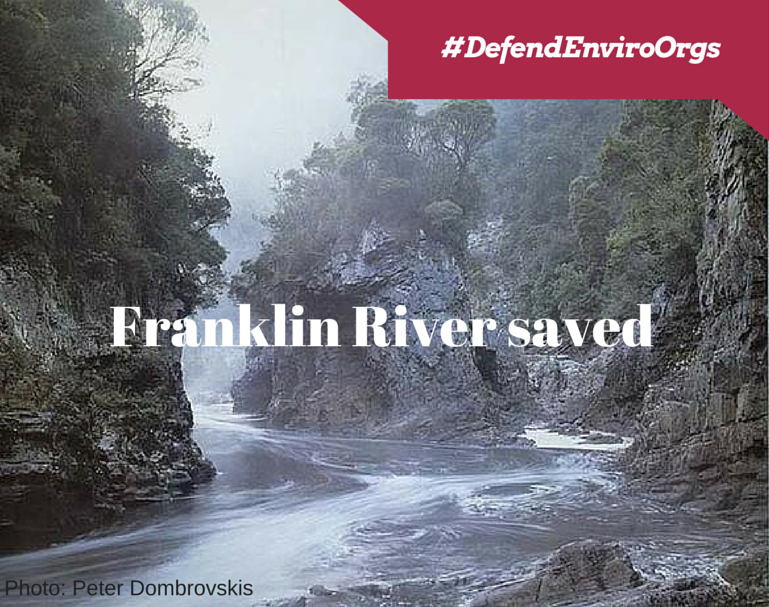More than thirty years ago people in Tasmania made history as nonviolent protest changed the nature of political debate on the environment in this country.
In recent years, politicians from both sides of the political divide have honoured that victory.
The Franklin River is enjoyed by people today, because of those hardy souls who made history decades ago.
This week in Hobart, key figures from that campaign, and other organisations protecting Tasmania’s iconic wild places, will appear before a hostile parliamentary inquiry seeking to strip environmental organisations of their public support.
The intent of the inquiry has always been clear – even before being telegraphed by outspoken right wing warrior MP, George Christensen.
It’s about removing funding for environmental organisations… despite their work in the interests of all Australians.
The environmental movement in this country has much to be proud of – both in the victories of the past, and in more recent evolution and new alliances of today. Farmers are now standing with environmentalists, to defend our commons – our farmland, water and climate. Traditional custodians have signed protection treaties with community organisations, after successive governments have turned their back on them.
Just as more than 1,200 people made history as they were arrested on the frontlines at the Franklin, new stories are being written now. These are moments that will be remembered, that people will look back on, and be proud to be part of.
The first sustained coal mine protest in Australia’s history; the powerful resistance led by a new generation of First Nations activists that is taking over the streets of our cities in the name of connection to country; and war veterans returning to new fossil fuel frontlines over and over.
The citizen science highlighting mismanagement and unlawful practices in our forests, which is recognised by the UN, but threatened with arrest by state government; the small Broome community that stared down multinational corporations to defend James Price Point; and farmers in New South Wales protecting the food for our tables.
People are standing in the way. They are farmers locking their gates, professors clambering on bulldozers, Indigenous peoples putting canoes in front of coal ships, religious leaders blocking roads and MP’s offices and young leaders reciting poetry as they bring cities to a standstill.
They are often left with this option of last resort as all traditional processes fail them, and natural justice is nowhere to be found.
These are our stories. Protest and dissent is in the DNA of this country, we love our bushrangers and our rebels. Standing up for the little guy. For justice and simple human kindness. Defending our sacred places. Holding safe our wilderness areas for all. Advocating for clean air, safe groundwater, fertile farmlands and a viable climate. Standing up for democracy and human rights.
Civil disobedience and protest is vital in a democracy. It opens up political space for communities to have a say as the doors of governments are closed to them, and the price of entry to corporate boardrooms and political party fundraisers is put out of their reach.
Yet the coal industry, and their enthusiastic enablers in government, see no irony in attacking the environmental sector for a lack of funding transparency and engaging in political advocacy.
They spend millions on their public relations campaigns, social license “offsets” and sponsorship, subsidised by tax payers, yet cry havoc when communities’ call for help from experienced campaigners to support them and provide advocacy skills.
Nonviolence training, advocacy and education has been an integral part of iconic movements and campaign victories in the last 100 years. The civil rights movement saw highly organised trainings, and here in Australia it was virtually mandatory to undergo nonviolence training before participating in the Franklin River blockade.

It was part of the campaign to stop uranium mining at Jabiluka in Kakadu, and more recently to save Walmadan/James Price Point and forest defence campaigns all over the country have all involved training.
Isn’t it better to teach nonviolence and de-escalation skills to community members who may be involved in this generations Franklin campaign? It isn’t a level playing field. So why shouldn’t people trying to protect our natural environment get access to education?
Even this government’s own general counsel for the Department of Environment, on the first day of hearings for the parliamentary inquiry, alongside assertions that there was little issue of concern regarding environmental organisations, stated, “I think, for example, protesting could be considered to be a form of education.”
Civil disobedience and nonviolent direct action was crucial in battles for our environment, for workers rights, for women and our sovereign peoples having voting rights.
Me, I’m grateful that I can enjoy a beer in a bar and I think there should be a national holiday for Merle, who chained herself to a bar so I could enjoy that sacred right.
We need to push back against these attacks on the environmental and civil society. It doesn’t represent the interests of people in this country.
But wild rivers, protest, education and a vibrant democracy – these are things worthy of protecting and celebrating. Maybe even over a beer.

